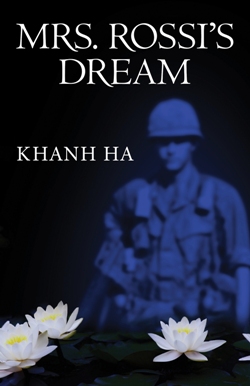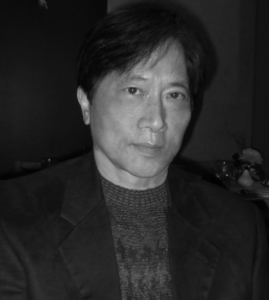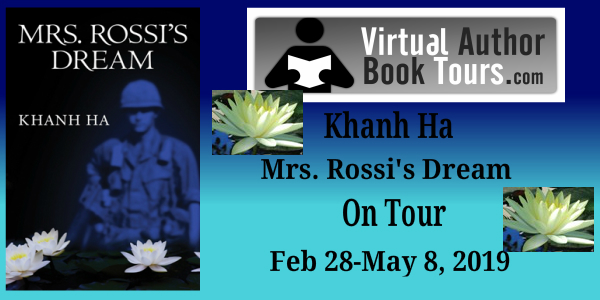
Publisher: The Permanent Press (March 1, 2019)
Category: Historical Fiction, Vietnam, Literary Fiction, Multicultural
Tour dates: Mar-Apr, 2019
ISBN: 978-1579625689
Available in Print and ebook, 312 pages
Description Mrs. Rossi’s Dream by Khanh Ha
“I live in a coastal town in the deep south of the Mekong Delta. During the war this was IV Corps, which saw many savage fights. Although the battles might have long been forgotten, some places cannot forget.”
Thus begins the harrowing yet poignant story of a North Vietnamese communist defector who spends ten years in a far-flung reform prison after the war, and now, in 1987, a free man again, finds work as caretaker at a roadside inn in the U Minh region. One day new guests arrived at the inn: an elderly American woman and her daughter, an eighteen-year-old Vietnamese girl adopted at the age of five from an orphanage in the Mekong Delta before the war ended. Catherine Rossi has come to this region to find the remains of her son, a lieutenant who went missing-in-action during the war.
“Mrs. Rossi’s Dream” tells the stories of two men in time parallel: Giang, the 39-year-old war veteran; Nicola Rossi, a deceased lieutenant in the U.S. army, the voice of a spirit.
From the haunting ugliness of the Vietnam War, the stories of these two men shout, cry and whisper to us the voices of love and loneliness, barbarity and longing, lived and felt by a multitude of people from all walks of life: the tender adolescent vulnerability of a girl toward a man who, as a drifter and a war-hardened man, draws beautifully in his spare time; the test of love and faith endured by a mother whose dogged patience even baffles the local hired hand who thinks the poor old lady must have gone out of her mind; and whose determination drives her into the spooky forest, rain or shine, until one day she claims she has sensed an otherworldly presence in there with her. In the end she wishes to see, just once, a river the local Vietnamese call “The River of White Water Lilies,” the very river her son saw, now that all her hopes to find his remains die out.
Just then something happens. She finds out where he has lain buried for twenty years―and how he was killed.
Awards Mrs. Rossi’s Dream by Khanh Ha
Parts of the book were previously published in literary magazines and became finalists for the following awards:
2016 Mary McCarthy Prize in Short Fiction (Sarabande Books)
2016 Many Voices Project (New Rivers Press)
2016 Prairie Schooner Book Prize in Fiction (Prairie Schooner)
2015 William Faulkner – William Wisdom Creative Writing Award (Pirate’s Alley Faulkner Society)
A short story adapted from the book won the 2013 Robert Watson Literary Prize in Fiction (The Greensboro Review)
Praise Mrs. Rossi’s Dream by Khanh Ha
“I read Mrs. Rossi’s Dream with a sense of awe, that one novel could answer so many lingering questions we’ve had about the tragedy of the Vietnam war and the men and women who suffered so greatly on both sides.”-Dan Pope, author of Housebreaking, Simon and Schuster
“Evocative, mysterious, and lovely, this is a remarkable book, for the beauty of the writing, the compassion for all the characters on any side.”-Judith Shepard, co-publisher and editor-in-chief of The Permanent Press
Praise Flesh and Demon Who Peddled Longing by Khanh Ha
“The Demon Who Peddled Longing is rich with the kind of sensory experience that translates into a reader’s complete immersion into another time and place, allowing them to fully inhabit a 19-year-old boy’s experience in Vietnam.
Khanh Ha’s Flesh, a visceral and harrowing read, serves as a brilliant companion for his new novel. The phrase ‘body of work’ is particularly appropriate to use in discussing these books, for they share a preoccupation with natural and organic detail.
In many ways the ordinary and innocuous details which fill Nam’s everyday life are as significant as the story’s more dramatic events and interactions.
A reader will be as likely to recall the scenes filled with moonshine rice liquor and blowfish in batter, as the episodes of intimacy and violence. The tastes (from snakehead fish to hot pepper sauce) and sounds (from the clanking of keys and a dog barking to the wind rustling and flute playing); what is smelled (from the dark damp earth to the ooze of infected tissue) and what is touched (from boils lanced on a loved one’s back to mushrooms cut and fried): all of these details add to the reader’s understanding of Nam’s experience.
Perhaps no sense is more integrally rooted in the story than the sights which are often both beautiful and harsh in the same instance. But whereas the tragic elements of experience seemed to engulf all other aspects of life in Flesh (likely deterring those readers who do not want to explore difficult subject matter in fiction), there is a solid foundation of beauty in this work. Vietnam is a beautiful country, one too rarely represented on the page.
As was the case with Flesh, The Demon Who Peddled Longing welcomes readers who seek – rather than have experience – of this time and place. The work’s themes emphasize the human experience, and this offers an excess of opportunities for the reader to connect with Nam and recognize common elements with his personal experience.
The Demon Who Peddled Longing straddles the individual and the human experience and explores the fragile connection between states of being. Writers like Khanh Ha take the reader into ordinary and glorious places.”-Buried In Print
“Ha’s prose is poetic as it paints the scene in which you can smell the opium, see and hear the brown of Tai’s village and the busy streets of Hanoi, and feel the delirium of smallpox or his pulse quicken as he begins to fall in love.
From the atmosphere to the myths and legends, Ha generates a novel that will capture readers from the beginning.
Flesh by Khanh Ha is a stunning debut novel that showcases the writer’s ability to become a young male narrator whose view of the world has been tainted by his life circumstances and tragedy, but who has the wherewithal to overcome and become a better man.”‒Serena, Savvy Verse & Wit
Interview Mrs. Rossi’s Dream by Khanh Ha
TR: Please tell us something about the book that is not in the summary. (About the book, the character you particularly enjoyed writing, etc.)
KH: As a Vietnam-born person who grew up in Vietnam during the war and later lives in the United States, I have the time to look back and form opinions about the war. I have read novels written by American authors as well as Vietnamese authors about the war and, though the books they wrote are informative—and good—I never feel that they are adequately addressed about the psyches that I want to know and feel. Perhaps as a journalism major I always desire to hear both sides of a story. So the novel I set out to write did just that.
“Mrs. Rossi’s Dream” is an ambitious, sweeping novel. It invites comparison with The Sorrow of War and The Things They Carried, in which it lets you see and hear a Vietnamese soldier’s voice when he was with the North Vietnam and later with the South Vietnam. It also lets you see and hear an American soldier’s voice, his raw perception of a lesser country in which he was sent to fight and how some of them come to love the country and its people. To make it work, especially the stories of the former North Vietnamese soldier (and also a drifter) and the dead American soldier, I arced the story through time and presented a swath of Vietnamese history through the lives of these characters.
In addition, the expanse of the world I created and the depth of the ideas that I was working with demanded evocative descriptions of both the Mekong Delta and the U Minh forest. The most difficult job of clarifying time—of clearly moving us from Giang’s time into the memories of Nicola Rossi as the voice of a spirit—required an innovative approach by using Nicola’s memory to raise the stakes so that Giang must battle his conscience to get this complex story. This also makes the ending all the more poignant. Unlike Paco’s Story, where you hear a ghost’s voice, like a camp-fire story, the voice of Nicola Rossi is a young man’s voice growing old from the other world, a compassionate yet mute voice.
TR: Tell us about the common theme all three of your books have.
KH: All of my three novels have their own themes. In Flesh, a coming-of-age story of brutal self-awakening and also a tender love story, the theme is temptation—the temptation of the flesh. But it refers equally to the obligations of kinship, the connections between us and those to whom we are related, even if we would choose not to be. In The Demon Who Peddled Longing, as a critic puts it, it is “a poetic portrayal of a journey that peddles longing, bravery, tragedy, love, and most of all, the rite of passage into adulthood.” Yet the juxtaposition of good and evil brings about “the theme of the reciprocity of benevolence between the characters, which endows the novel with a humanitarian perspective.”
In Mrs. Rossi’s Dream, a multifaceted story, it’s the compassion of one human being toward another that transcends cultural barriers. In light of this, Judith Shepard, co-publisher and editor-in-chief of The Permanent Press, said, “Evocative, mysterious, and lovely, this is a remarkable book, for the beauty of the writing, the compassion for all the characters on any side.”
TR: Tell us about your cover. Did you design it yourself?
KH: The book cover was designed by Lon Kirschner, chief artist of The Permanent Press. He took pride of the cover he created for Mrs. Rossi’s Dream by featuring it on his website.
TR: How long did it take you to complete?
KH: About two years—writing it then editing the draft.
TR: What is your favorite scene in the book? Why?
KH: The scene in the opening chapter: The old men walking down the road in his bone-burying routine. I had seen him many years ago on my way to work every morning. I never knew where he came from, but he’d end up in my novel. Every morning he’d show up out of nowhere and he’d walk down the road, one thumb hooked onto his belt, looking back nervously for the sight of a bus. Every morning he’d stand on the curbside at a bus stop, dressed in a corduroy jacket, the same trilby hat pulled down to shade his eyes, a brown lunch bag clutched in his hand.
Sometimes he stood among riders, sometimes by himself. A bus came and left. He stayed behind with his bag in hand then, after adjusting his hat a few times, trod on down the road to the next bus stop. A bus would pull in and be gone with its riders. He remained under the bus-stop sign as though he’d just gotten off the bus. Then he’d walk on. I remembered everything about him like a stock photograph—the incessant flick of his wrist to tell time, the darting eyes, the obsessive peep into his lunch bag every few seconds. One morning I drove to work on the quiet road. On the edge of the road stood the man, his feet shifting nervously, his head nodding as if on a spring. He stuck out his thumb when he saw my car. I pulled up against the curb and looked into the rear-view mirror. He glanced toward me, then looked the other way, his thumb stuck out. I realized I shouldn’t have stopped. Yet the man’s idiocy suddenly lost its absurdity and he looked more like someone not seen but known for some time.
TR: Which actor/actress would you like to see playing the lead character from your most recent book?
KH: I never imagine that. Honestly, I’m afraid to see my work turned into a commercial movie instead of an artistic movie. But I could conjure up the letdown when that happens—a badly portrayed movie.
TR: How completely do you develop your characters before beginning to write?
KH: Those who read novels that revolve around characterization with an atmospheric setting might take comfort in this novel. But first I must mention the research which allows for the setting. Then the voice. Finding the voice for your point-of-view narrator is the most challenging part about writing.
Now on characterization. Unlike an actor who plays just his role, an author plays all his characters’ roles, like a man who plays chess against himself. You can imagine characters. Yet until you write them out, you haven’t known them. Put them in motion. Let them interact with one another. Let them live in some environment. It’s then that you begin to explore your characters’ depths. If you ask me what the hardest part in writing a novel is, I’ll tell you: characterization. That’s what separates a literary novel from a potboiler. Characters shape a story line, not the other way around. You can’t think up a plot and then shoehorn your characters into it. If you do, you are writing a potboiler. In fact, well-developed characters create a more convincing story line, even shaping it or altering it against your original vision.
TR: Describe the room you are sitting in as though it was a scene in one of your books.
KH: Hung on the wall facing me is a framed abstract painting of the Buddha. On my right is a large wall art calendar of Asian art motifs that, looking at it during my writing breaks soothes my mind.
TR: Is there a question that you would have liked me or another blogger to ask but didn’t?
KH: Perhaps a question on hard scenes.
Writing is just like any normal part of our daily life. It ebbs and flows. The worst thing to a writer isn’t writer’s block but illness, prolonged, unbearable illness that can really affect his writing. Other than that, as Hemingway once said, there will be days when you have to drill rock and then blast it out with charges. When that happens, just take a break, do something else and let your battery be recharged.
There are no hard scenes to write. Really. Those so-called difficult scenes are what writers make them out to be with their paranoia. So before they can write such scenes, their anxiety has already killed their creativity to write them.
TR: Finally, what upcoming events and works would you like to share with the readers?
KH: My upcoming work is a historical novel narrated by a 16-year-old mute girl whose inheritance from her estranged father is his lifetime artwork. One thousand and forty-three drawings and paintings in ink, pencil, charcoal, oil, watercolor. Born mute, she lives in the Mekong Delta with her mother and grandparents who own an herbal store. Her father was a North Vietnamese communist who defected to the South. When Hai Yen turned seven, her father made a trip to North Viet Nam to visit his birthplace which he had not seen in 40 years. The year was 1994. He never came back.
From her father’s diary, his sketchbook, his lifetime artwork, and the work he contributed to the Must Win newspaper at frontline during the siege of Dien Bien Phu in 1954, she recreates a love story so innocent and vulnerable within an epic Stalingrad of the East. Through her own sensitive narrative, you hear a young girl’s thoughtful voice, who goes through self-discovery and awakening sexuality much like Anne Frank in The Diary of a Young Girl, as she patiently tells a story with a hall-of-mirrors effect about the battle of Dien Bien Phu, through a visceral montage of stories, in a colossal portrait of humanity in conflict.
About Khanh Ha
Award winning author, Khanh Ha is the author of Flesh (Black Heron Press) and The Demon Who Peddled Longing (Underground Voices). He is a seven-time Pushcart nominee, a Best Indie Lit New England nominee, twice a finalist of The William Faulkner-Wisdom Creative Writing Award, and the recipient of Sand Hills Prize for Best Fiction, and Greensboro Review’s Robert Watson Literary Prize in fiction. The Demon Who Peddled Longing was honored by Shelf Unbound as a Notable Indie Book. Ha graduated from Ohio University with a bachelor’s degree in journalism.
Website: http://www.authorkhanhha.com
Twitter: https://twitter.com/authorkhanhha
Facebook: http://www.facebook.com/authorkhanhha
Pinterest: www.pinterest.com/khanhha
Buy Mrs. Rossi’s Dream by Khanh Ha
Giveaway Mrs. Rossi’s Dream by Khanh Ha
This giveaway is for the choice 3 print copies or ebook copies of the book , 1 copy per each of 3 winners. Print is available to Canada and the U.S. only but ebook is available worldwide. This giveaway ends on May 8, 2019 at midnight pacific time. Entries are accepted via Rafflecopter only.
Follow Mrs. Rossi’s Dream by Khanh Ha Tour
Teddy Rose Book Reviews Plus Feb 28 Interview
Autumn Amazon Mar 1 Review
Kate Goodreads Mar 4 Review
Don Amazon Mar 5 Review
Cremona Mythical Books Mar 7 Guest Review
Carole Rae’s Random Rambling Mar 8 Review
Christine’s Book Corner Mar 11 Guest Review & Guest Post
Toots Book Reviews Mar 12 Guest Review & Excerpt
Dawn Bound 4 Escape Mar 13 Guest Review
Nancy Reading Avidly Mar 15 Review
Jas International Book Reviews Mar 18 Review & Interview
Buried In Print Apr 1 Review
Teddy Rose Book Reviews Plus Apr 18 Review & Excerpt
Beth Amazon Apr 30 Review
Nicole Willow’s Thoughts Book Obsessions May 7 Review & Excerpt
Serena Savvy Verse & Wit May 8 Review






